On Wednesday afternoon at 3 p.m., the newly chosen team, which has been given the task of designing a permanent and independent civilian probation oversight commission for the nation’s largest probation department, gathered for its first public meeting.
The standing room only crowd that jammed the 7th floor room in the Kenneth Hahn Hall of Administration to observe the meeting, was made up primarily of justice advocates and community activists, plus a smattering of county officials, including several higher-ups from probation—Sheila Mitchell, and Reaver Bingham—plus a lot of people from Supervisor Mark-Ridley Thomas’s, including the supervisor himself in the front row.
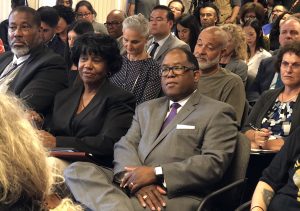
Probation’s Reaver Bingham, Sheila Mitchell, and Supervisor Mark Ridley-Thomas listen to the new team’s presentations. Photo via WLA
The group that will actually do the work is to be known as the Probation Reform and Implementation Team, or PRIT.
(Oh, the joy of acronyms!)
The team is made up of eight members, five of whom have been appointed by each of the five LA County Supervisors. Rounding out the group are a representative each from the probation department, from county counsel, and from the county CEO’s office. Finally, there is the team chairperson/consultant who will run the meetings, and will also, one assumes, provide the tie-breaker vote, when needed.
The creation of the panel was originally set in motion on Tuesday, May 1, 2018, when the Los Angeles County Board of Supervisors unanimously passed a motion that triggered the creation of the new oversight commission.
“It is well documented,” wrote the motion’s authors, Supervisors Mark Ridley-Thomas and Hilda Solis, “that the Department has struggled for years to fulfill its mandate of rehabilitating and reintegrating the youth and adults it serves.”
(A quick perusal of some of WitnessLA’s stories over the last few years make clear that Solis and Ridley-Thomas’s statement is not one it would be wise to dispute. For a few random examples look here and here and here and here and here and here.)
An earlier step in the direction of an oversight body occurred, a month before the vote, on April 9 2018,, when LA County Chief Executive Officer Sachi Hamai delivered a concise 11-page report to the board outlining a detailed plan to establish a Probation Oversight Commission (or POC), which would “mirror” the Sheriff’s Civilian Oversight Commission, according to the report.
The proposed new commission, as envisioned, was to use the LA County OIG as its investigative arm, which would give the body some much needed teeth.
As many readers likely remember, LA’s Probation Department already has a commission. But the present Probation Commission, created in 1903 to advise the then Chief Probation Officer, is hampered by the fact that it has no real power. It can make recommendations to the probation chief, but that’s about it. It has no budget to speak of, and no staff. And it has no appreciable investigative capacity— past what resourceful commission members can grab by force of personal will and sometimes stealth. In fact, when the probation commissioners try to get information from the department, sometimes they get it, often they don’t.
The new commission will be built, legally speaking, on the footprint of the present commission. This is because according to County Counsel’s lawyers, expanding on the existing charter will give the project a quicker and easier path through the inevitable bureaucratic quicksand, than would starting over from zero.
Creating a detailed plan for this new oversight commission is the job of the Probation Reform and Implementation Team, which will include working out a recommendation as to how the existing Office of Inspector General could expand its duties to provide an investigative arm for the new oversight body.
The team will also develop requirements for selection of the POC’s members.
Another crucial function of this temporary team is the task of synthesizing “decades worth of reform recommendations for probation” into a single unified vision for reform that weaves together the most important parts of these stacks of pricey reports into a single roadmap that the department can use to move forward. Then, one of the main purposes of the soon-to-be-created Probation Oversight Commission will be to act as a watchdog to make sure probation stays on the newly mapped road.
What exactly that roadmap of purpose should look like is one of the questions that the advocates and activists in the audience don’t want to see answered without plenty of community input.
The team will meet monthly, in public, for six to nine months to develop its recommendations.
The team
The make-up of the Probation Reform and Implementation Team is potentially promising. At least that is the hope. The team members chosen by the Supes are as follows:
Alex Sanchez, appointed by Supervisor Hilda Solis, is the head of Homies Unidos, an LA –based violence prevention and intervention program for youth that he co-founded in 1996, which has worked with at-risk and disadvantaged youth and their families for the last 22 years, many in the Latino and largely Central American communities of the Pico Union, Westlake and Koreatown areas of Los Angeles.
Now an internationally-known expert on gang culture, and violence prevention, Sanchez came to the U.S. from El Salvador at age seven, and joined a gang in his own youth. Sanchez spent time in state prison, and was deported to El Salvador at age 22, where he and others were reportedly targeted by Salvadoran death squads. After a harrowing return to the U.S., he began what would become his violence intervention and youth development work, and was eventually able to receive political asylum. Most recently, Sanchez has been sought out in the U.S. and elsewhere, for his expertise in MS-13, the gang to which he once claimed membership, and on the experiences of immigrant children and their families fleeing north to escape gang violence, a population that he and Homies Unidos continues to work with.
Cyn Yamashiro, appointed by Supervisor Mark Ridley-Thomas, is a former public defender, and former private defense attorney, who, at Loyola Law School, created one of the first legal clinics on the West Coast dedicated to criminal defense.
He is on the advisory board of the Loyola Law School Center for Juvenile Law and Policy, was a founding member of the Pacific Juvenile Defender Center, and for the Center for Juvenile Justice in Boulder, Colorado. Yamashiro is also Ridley-Thomas’s appointee to the existing Probation Commission, where he served as president for two years. On October 12, 2016, the Los Angeles County Board of Supervisors authorized a partnership with the Los Angeles County Bar Association to create a new office, the Independent Juvenile Defender Program (IJDP). The program handles juvenile delinquency cases that present a conflict of interest for the Public Defender and the Alternate Public Defender, and Yamashiro became its first Directing Attorney.
Dr. Sheila Balkan, appointed by Supervisor Sheila Kuehl, is a criminologist who has served as a research consultant for LA County Probation, the Los Angeles and Department of Mental Health Social Services, and other county agencies.
She has taught Sociology at UCLA and Los Angeles Valley College and, as a specialist in sentencing evaluations and reports, Dr. Balkan has participated in approximately 4000 state and federal cases in the last 30 years, where she aids in finding and recommending appropriate sentences or sentencing alternatives for individual defendants. Balkan also holds a private investigator’s license in the State of California.
Jose Osuna, appointed by Supervisor Janice Hahn, is the former director of External Affairs at Homeboy Industries, where he led Homeboy’s external advocacy initiatives, such as ‘Banning the Box’ from employment applications, an important issue for Homeboy, where reportedly up to 75% of those who seek their services have served prison terms and have felony convictions. Also at Homeboy, he was Director of Employment Services, and the head of the Solar Panel Installation Training and Certification Program.
Before arriving at Homeboy, Osuna served thirteen years in state prison, and had been gang involved since the age of ten. Nine years ago, Osuna’s 17-year-old son was killed as a result of gun violence. He now runs Osuna Consulting, where he and his team consult in the area of gang rehabilitation, community based re-entry solutions, community organizing, and social justice advocacy efforts, and is a member of L.A. County’s Blue Ribbon Commission on Public Safety,
Mack Jenkins, appointed by Kathryn Barger, served as Chief Probation Officer for San Diego County from 2007 to 2016, and now serves as Senior Policy Advisor to the Justice Reinvestment team at the Council for State Governments, which assists “supervision agencies” across the nation in “adopting best practices to reduce recidivism and increase public safety.” Before heading up San Diego’s probation department, Jenkins worked for 30 years in the Orange County Probation Department. While in Orange County, he helped design the jurisdiction’s first drug court and subsequently helped develop additional drug, DUI, and mental health courts.
Jenkins is an expert in the implementation of evidence-based practices in community corrections. He serves on the board of the National Association of Drug Court Professionals, and the National DWI Court Task Force. Jenkins was appointed by Governor Jerry Brown to the California Council on Mentally Ill Offenders, the California Prison Industry Board.
The team’s chairperson/consultant Saul Sarabia, is, among other things, an expert in training individuals and groups in the art of changing public policy. Sarabia has served as a human rights advocate in Central America, a welfare rights advocate for homeless families in San Pedro, CA, a community organizer in South Los Angeles. He was the Director of UCLA School of Law’s Critical Race Studies Program from 2005 to 2011, and served as an advisor to the Los Angeles chapter of “All of Us or None,” which organizes formerly incarcerated people “to change laws and policies that discriminate against them.” He now does independent consulting in which he strategizes “with community leaders to shape public policy and change the legal system.”
Indeed, Sarabia seems hearteningly at ease showcasing his team members, and then fielding around an hour’s worth of questions and comments from the audience.
Next steps
“This is a long time coming,” Supervisor Ridley-Thomas told WitnessLA on Wednesday, regarding the kick-off of the creation of an independent body that can hopefully “drill down into the challenges” that the probation department has had “and is still having.”
This team, he said, “is charged with leaving no stone unturned,” as it does its work in a “public and open forum.” He is very, very hopeful, said Ridley-Thomas, that the newly introduced team is the right group to do the job of helping to birth the POC.
Supervisor Hilda Solis issued an upbeat statement expressing hope that the team would “set into motion a process” to ensure that changes to the probation department “align with “a truly transformational mission and vision.”
Chief Probation Office Terri McDonald said she welcomes the implementation team’s work.
The feedback from those we spoke to in the audience included skepticism along with cautious optimism.
According to Julio Marcial, the director of youth justice at the Liberty Hill Foundation, and a longtime youth advocate, the big question is whether the new oversight commission will be “a creature of the board of supervisors,” or will it be granted real “independence?”
How, exactly will things work with the Inspector General’s Office? Marcial told us was another crucial question. . “What sway will the eventual POC really “hold over the actions of the probation dept?” Can oversight be accomplished by a body that is merely advisory? Marcial asked.
“The answers to these and other questions are fundamental” in determining whether the POC will become “a useful tool for good probation-community relations and for transparency and accountability,” he said, instead becoming “another sedimentary layer of bureaucracy that consumes resources but offers little in return.”
Still, Marcial said he saw Wednesday’s meeting as “a step in the right direction.”
The next meeting will be held in September, with the exact date, meeting location, and agenda to be announced on the team’s snazzy new website.
We will, of course, be tracking the team and the story so….as always….stay tuned.



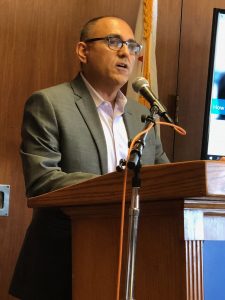
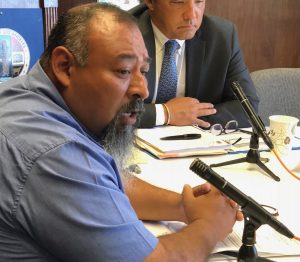
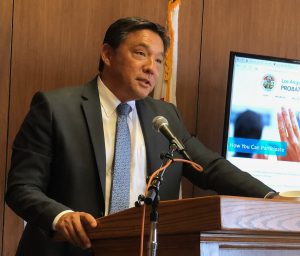
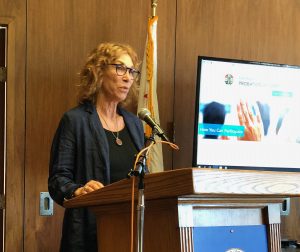
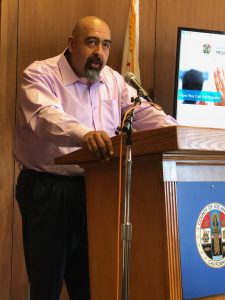
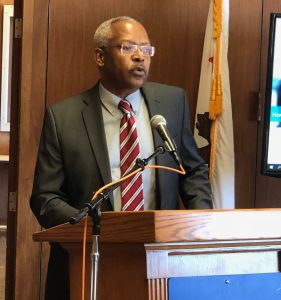
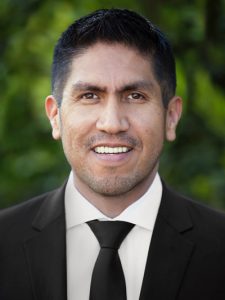
C: you are kidding, right? The last time we had a “Community Organizer” he was touted as a messiah (small m) and we almost had WWIII. Remember that clown with the Redline” in the desert remark? How ironic you have three convicted felony gang members and why isn’t their crimes posted? Can we say Murder?A PD from Colorado? Ok, what does he bring to table except how to get gangsters off their crimes? Any stats on Dr. Balkan and her 30 years of getting crooks to commit crimes again. I mean what was her verified success rate? The only one worth a hoot is Mark Jenkins. I would start over and try again.
I totally agree that Probation needs much needed change but….?There will be more internal stealing, lying and general crime. Make sure that there is a financial audit every month. In that way they can’t steal it all, I hope?
There is way too much flowery rhetoric and insincere political tripe for anyone to take this seriously! Just look at the LASD commission-how’s that working? And who is on that commission?
So a couple of ex cons, some clueless liberal academics, and a few professional scam artists who’s speciality is getting their snout in the public trough are going to come up with a commission eh? Kinda reminds me of Merrick Bobb and Mike Gennaco. Another bunch looking to line thier own pockets. Of course Clueless LA thinks this is great and gives their full throated support.
Give it a little while and clueless LA will be back to running stories on the probation dept’s latest failure and pushing the latest “reform” fad. This bunch of knuckleheads and grifters will soon be forgotten, along with a nice little sum of money that no one really cares about anyways. Government 101 and silly white lady liberal journalism.
As a law enforcement executive, court recognized gang expert and criminal justice professor I had the pleasure of working with Jose Osuna on the Original Probation Commission Oversight Work Group. His life experience as a youth, as a convict and as a community activist bring to the table a perspective that is often over looked.
I got to know Jose and respect him for his candor, honesty, integrity and caring heart he brings to the project. Never judge a man until you walked a mile in his shoes. I am by no means liberal, simply pragmatic.
His service on the prior Original Probation Commission Oversight Work Group will also be beneficial as the PRIT try and bring to final resolution to this project. Despite all the ugly stories in the media, there are many more where Probation Officers have had a positive change on individuals.
I find it fishy that the person representing the Department interests is someone who has held her job for less than a year. What were her qualifications for being appointed to this important commission let alone to the job she holds (Chief of Staff). Oh, I know. She knew big red from Sheriff days. Again not what you know but who. This is going to to turn out badly for the Department and when everything hits the fan all these people will be gone.